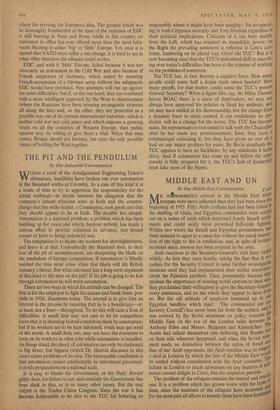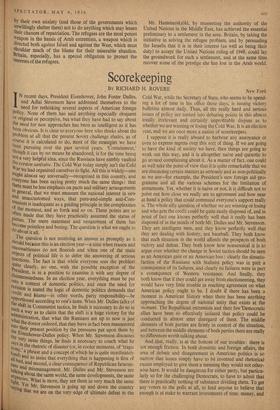MIDDLE EAST AND UN
By Our Middle East Correspondent Cairo MHAIIMARSKALD arrived in the Middle East when tempers were more inflamed than they had been since tilt beginning of. 1955. Fifty Arab civilians had just been killed is the shelling of Gaza, and Egyptian commandos were scalng out on 'a series of raids which terrorised lonely Israeli settle' ments and could easily have provoked full-scale fightiaP' Within two weeks the Israeli and Egyptian governments bad been induced to agree to a cease-fire without the usual reservI; lion of the right to fire in retaliation, and, in spite o1 isolate` incidents since, tension has been reduced in the area. Arab reactions to the Secretary-General's visit have varied widely. At first they were hostile, taking the line that it 0: useless for the Security Council to send further investigattab missions until they had implemented their earlier resolutions about the Palestine problem. Then, presumably because theY realised the importance of winning world opinion to their ode; they proclaimed their willingness to give the Secretary-Gener°: every assistance, and on the whole they appear to have don'' so. But the old attitude of suspicion (summed up in cnIc Egyptian headline which read : 'The commandos are olIc Security Council') has never been far from the surface, and It was revived by the Soviet statement on policy towards 11!° Middle East on the eve of the London talks between , ,. Anthony Eden and Messrs. Bulganin and Khrushchev. The Arabs had talked themselves into believing that Russia was on their side whatever happened, and when the Soviet statt'd meat made no distinction between the status of Israel all,t that of her Arab opponents, the Arab reaction was to stori",1 a deal in London by which the fate of the Middle East vi011,,"0 be settled without consultation with the Arab countries. 'I'," failure in London to reach agreement on any matters of stw stance caused delight in Cairo, but the suspicion persists. The problem of the refugees remains the central and crucl,f one. It is a problem which has grown worse with.the lapse time, since the numbers of the refugees have increased and Au for the most part all efforts to resettle them have been frustrate by their own anxiety (and those of the governments which, unwillingly shelter them) not to do anything which may lessen their chances of repatriation. The refugees are the most potent weapon in the hands (4 Arab extremists, a weapon which is directed both against Israel and against the West. which must shoulder much of the blame for their miserable situation. Britain. especially, has a special obligation to protect the interests of the refugees. Mr. HammarskjOld, by reasserting the authority of the United Nations in the Middle East, has achieved the essential preliminary to a settlement in the area. Britain, by taking the initiative in solving the refugee problem, and by persuading the Israelis that it is in their interest (as well as being their duty) to accept the United Nations ruling of 1948. could lay the groundwork for such a settlement, and at the same time recover some of the prestige she has lost in the Arab world.











































 Previous page
Previous page